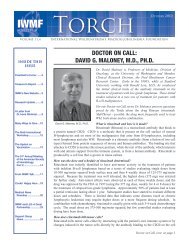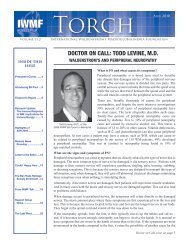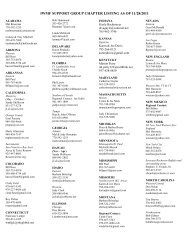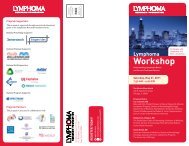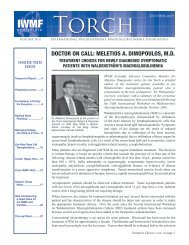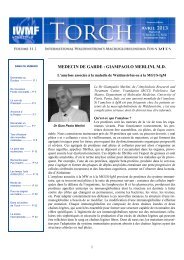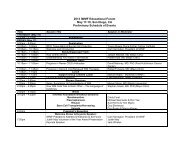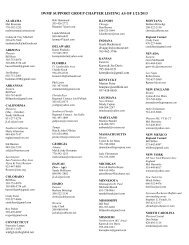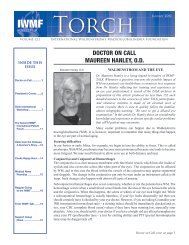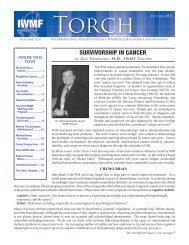Fall 2007 - International Waldenstrom's Macroglobulinemia ...
Fall 2007 - International Waldenstrom's Macroglobulinemia ...
Fall 2007 - International Waldenstrom's Macroglobulinemia ...
Create successful ePaper yourself
Turn your PDF publications into a flip-book with our unique Google optimized e-Paper software.
PAGE 6<br />
Research Clinical Highlights, cont from page 1<br />
Veronique Leblond, Irene Ghobrial, and Meletios Dimopoulos<br />
(principal organizer of the upcoming Kos workshop). Dr.<br />
Myers insisted, and Dr. Dimopoulos agreed, that the workshop<br />
should include a consensus panel charged with updating the<br />
treatment recommendations for both frontline and salvage<br />
therapy from the 3rd <strong>International</strong> Workshop on WM .<br />
As we are all aware, the pace of scientific research continues<br />
unabated, and numerous new treatments have come into<br />
existence and have been evaluated in rigorous clinical trials<br />
since October 2004. The IWMF is proud to have encouraged<br />
and facilitated the updated recommendations for new<br />
treatment guidelines for WM. It is important to note that<br />
the recommendations outlined in this article have not yet<br />
been fully implemented. Drs. Treon and Dimopoulos will<br />
now present the Kos recommendations to a number of WM<br />
clinical experts for final approval; scientific publication will<br />
follow in the clinical literature. The IWMF will also update<br />
two of its most important publications, “Treatment Options”<br />
(August 2003) and “Questions and Answers” (August 2003).<br />
What follows is an outline of the proposed recommendations<br />
for both frontline (initial) and salvage (after the first failed<br />
remission) therapy, updating the previous recommendations<br />
issued following the 3rd <strong>International</strong> Workshop on WM in<br />
2004. I include as well my own comments and observations<br />
since I was privy to the interesting and lively debate which<br />
took place on the very warm island of Kos.<br />
1. Frontline therapy<br />
Frontline (up-front) therapy for WM (in never-before treated<br />
patients) includes:<br />
Monotherapy (single agent therapy)<br />
• alkylator agents cyclophosphamide (Cytoxan),<br />
chlorambucil (Leukeran)<br />
• nucleoside analogs such as fludarabine (Fludara),<br />
cladribine (2CdA), and pentostatin (Nipent), which<br />
is used more commonly in Europe<br />
• the monoclonal antibody rituximab (Rituxan)<br />
Combination therapy<br />
• (RF, RC, RP) rituximab + fludarabine/cladribine/<br />
pentostatin<br />
• (R-CHOP) rituximab + cyclophosphamide +<br />
doxorubicin (Adriamycin) + vincristine (Oncovin) +<br />
prednisone<br />
• nucleoside analogs + cyclophosphamide +/-<br />
rituximab<br />
• (DRC) dexamethasone (Decadron) + rituximab +<br />
cyclophosphamide<br />
• thalidomide (Thalomid) + rituximab<br />
Comments<br />
• Since WM patients are at increased risk of chemoinduced<br />
peripheral neuropathy, bortezomib (Velcade)<br />
was not considered upfront therapy because of the<br />
high risk of neuropathy. However, the incidence of<br />
Velcade-induced neuropathy decreases greatly with a<br />
reduced dosing schedule such as weekly versus twice<br />
weekly. New generations of proteosome inhibitors<br />
from the Velcade family show no neuropathy in early<br />
trials.<br />
• Alkylator agents are not recommended in young<br />
patients (



